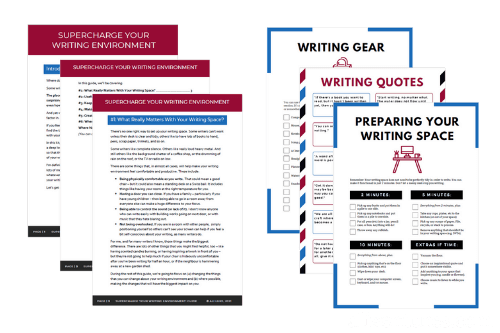How to Write When … You Don’t Have a Good Writing Space

This post is part of my occasional “How to Write When” series.
Are you struggling to find the physical space to write without interruptions?
Many writers don’t have a dedicated office or study at home to work from. And if family members are around when you’re trying to write, it can be difficult to find the space you need so you can focus.
It’s easy to tell yourself that it shouldn’t matter – that you should be able to write from the sofa, the kitchen table, or whatever space presents itself.
But writing space does matter. And it’s well worth spending a little bit of time creating or finding a good space to write.
Why Does Your Writing Space Matter So Much?
Writing happens, primarily, inside your head. It doesn’t require much in the way of external tools. You could write in a notebook with a pen, on a laptop, or even on a phone or tablet. It’s not like being a painter, where you need space for a canvas and paints.
So as a writer, you might not really think about needing space to work.
But … even though a lot of the work of writing takes place inside your head, your physical space can make a huge difference to what happens in there.
Personally, I find it impossible to write if there are other people in the room who can see my computer screen. I freeze up and can’t concentrate, because I hate the thought of people seeing what I’m writing before it’s complete. (The other people in the room probably aren’t paying any attention to what I’m doing, but just the idea of it is distracting.)
It’s also difficult to write if other people are likely to interrupt you because they need the space that you’re using. If you’re writing at the kitchen table, but your partner needs to set it for dinner, then you’re going to have to move your laptop. If you’re writing on the sofa, but your kids want to watch TV, again, you might have to move.
A comfortable space also matters. I could, in theory, write while I’m sitting on the landing outside my 7-year-old’s bedroom, on the nights when he’s struggling to sleep and wants a parent nearby. But it’s definitely not a comfortable position in which to sit and type.
Perhaps you’re facing challenges like these with your writing space, or something different – like not having anywhere to leave the reference books that you need.
Whatever the issue, here’s how to find the space to write – even when you have a small home or a home where all your space is shared with other people.
Four Ways to Find the Space to Write (Even in Challenging Circumstances)
#1: Get Out of Your Home and Write Somewhere Else
Often, the easiest solution to not having a good writing space at home is to leave your home so you can write.
You don’t need to tidy up the kitchen table, negotiate space with other household members, or put together a new desk. You can just pack up your laptop or notebook and head out the door.
Coffee shops and libraries are great places to write for a couple of hours. If you have longer, and it’s practical for you to do so, you could book a local hotel room for hours of peaceful writing in your own space.
#2: Have a Portable Device to Write On
If you normally write on a desktop computer, using a portable device instead could make it much easier to find a writing space. While you can move a desktop computer (or a heavy, ageing laptop) around, it’s definitely easier to move around a small, light laptop, a tablet, or a mobile phone.
Obviously, you might not be in a position to simply go out and buy a new device – though by all means treat yourself to a laptop to use just for your writing, if you can afford it! You likely already have some kind of device you could use.
Writing on a phone or tablet is easier than you might think. You don’t need to type on the touch screen (unless that comes easily to you). Instead, you can use a portable keyboard. Your phone or tablet plus the keyboard can fit easily into your bag or even a pocket. You could use them anywhere in your house – or at a local coffee shop or library.
#3. Use Your Bedroom
Even if you share your bedroom with a partner (or roommate or sibling), you hopefully have at least half of a bed that belongs to you and you alone! If there’s no space in your bedroom for a chair and desk, you can use your bed.
I sometimes write in bed, propped up with pillows and with my legs stretched out in front of me. It’s not comfy for very long (and sometimes I start to nod off…) but it can work well for short stretches of writing. If you like to write first thing in the morning or last thing at night, your bed could be the perfect location.
If you do want to write regularly from bed, you might want to invest in a bed desk. This is a tray-style desk on short legs that you can place over your legs in bed, so you can easily work on it.
#4: Create a Portable Writing Space
Sometimes, having just one writing space in your home doesn’t quite work. Maybe you like to write from bed in the evenings, but that doesn’t work first thing in the morning because your partner sleeps later than you. Or perhaps you can easily use the kitchen table while your kids are at school, but it’s not at all practical in the evenings.
This is where a portable writing space comes in. You’ll need a bag or box that can contain all the things you need on a regular basis when writing. For me, that’s my Chromebook, headphones, mouse, charger and (currently) my tablet as I like to refer to the first draft of my novel on there while I write the second draft.
You might want to add in things like pens, a notebook or planner, or even snacks.
It might take a minute or two to pack things up each time you finish a writing session in one location, but by keeping everything together, you can quickly set up to write again somewhere else.
You don’t need the “perfect” writing space in order to write … though it’s always nice to daydream. 😉
Instead, find a “good enough” writing space that works for you and your daily routines. Anywhere quiet and comfortable can become your new writing spot.
Supercharge Your Writing Environment
For more help setting up a writing space, and ideas for making the most of whatever space you do have – even if it’s not much at all – then check out Supercharge Your Writing Environment.
This guide is the third in my Supercharge Your Writing series (which can be read in any order). It’s designed to help you find space and feel inspired, rather than drained, by your writing environment.
Along with the guide itself, you also get some bonus printables, including writing quotes to put up in your space, a checklist of essential writing gear, plus a quick checklist for preparing your writing space in just a few minutes.
You can get all the details about Supercharge Your Writing Environment here. It costs just $8 – or you can get the set of all four Supercharge guides for $20 total.
About

I’m Ali Luke, and I live in Leeds in the UK with my husband and two children.
Aliventures is where I help you master the art, craft and business of writing.
Start Here
If you're new, welcome! These posts are good ones to start with:
Can You Call Yourself a “Writer” if You’re Not Currently Writing?
The Three Stages of Editing (and Nine Handy Do-it-Yourself Tips)
My Novels

My contemporary fantasy trilogy is available from Amazon. The books follow on from one another, so read Lycopolis first.
You can buy them all from Amazon, or read them FREE in Kindle Unlimited.



A great and valuable post for all the writer community around the globe. Keep sharing such a valuable stuff.